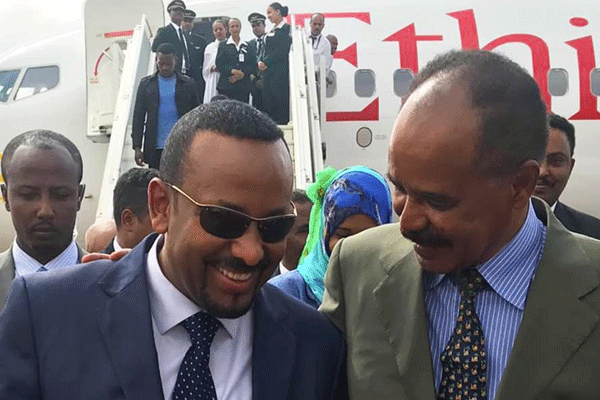Eritrea and Ethiopia normalize diplomatic ties
July 10, 2018 | Expert Insights

Eritrea and Ethiopia have agreed to restore diplomatic ties after nearly 2 decades of conflict in a landmark agreement.
Background
Eritrea and Ethiopia are neighbouring countries located in the Horn of Africa. Eritrea was once part of Ethiopian territory following World War II and became independent in 1991. The Eritrean-Ethiopian War occurred between 1998 and 2000 over border rivalries, and is considered one of the worst in African history.
Territorial boundaries in pre-colonial Africa were very fluid, with several families living across borders. Sometimes even post-colonial territorial agreements failed to partition regions successfully. After Eritrea’s independence from Ethiopia, the latter lost direct access to the Red Sea. It had to depend on Eritrea for its trade to cross the Red Sea zone. Both Eritrea and Ethiopia wanted control of the key border town of Badme, commencing the conflict in 1998. In-fighting occurred in many other towns. Despite intervention by the UN and Organization for African Unity (OAU), the conflict escalated. Ethiopia occupied a large part of Eritrean territory, including the territory surrounding Badme. The war ended in 2000 with Ethiopia declaring its victory over Eritrea.
The conflict resulted in the death of hundreds of thousands of people and the massive displacement of civilians in both countries. The impact was heightened as both countries were also engaged in separate civil wars. Their economies, already feeble, further crumbled resulting in food shortages and destruction of infrastructure. It also led to regional destabilization. The 2002 Ethiopia-Eritrea Boundary Commission awarded Badme to Eritrea. However, Ethiopia refused to accept these terms and retained its troops there.
Analysis
Eritrean President Iasia Afwerki and Ethiopian Prime Minister Abiy Ahmed met Sunday in the Eritrean capital, Asmara to decide on a landmark agreement to end the decades old conflict between the two neighbours. They signed a “joint declaration of peace and friendship” on Monday, which specify five pillars. As per the first pillar, the state of war has ended. Through the other pillars, both countries will work to promote close cooperation in political, economic, social, cultural and security areas. In addition, transport, trade and telecommunication ties will be resumed and diplomatic ties and activities renewed. Previous border decisions will be implemented and both countries will work together to guarantee regional peace, development and cooperation. Ethiopia, a landlocked nation, will now have access to Eritrea ports on the Red Sea. "We agreed that the airlines will start operating, the ports will be accessible, people can move between the two countries and the embassies will be opened. We will demolish the wall and, with love, build a bridge between the two countries. Today, the Eritrean people, particularly the people of Asmara, practically showed us how stronger love is than the missiles of the day,” Abiy said. In June this year, a top delegation from Eritrea led by the Foreign Minister Mr. Osman Saleh had arrived in Addis Ababa, Ethiopia to discuss an end to the conflict.
Ethiopian Prime Minister, Mr. Abiy has been pursuing a reform agenda ever since taking office in April this year and announced that the country would implement the December 2000 Algiers agreement. The purpose of the agreement was to and hostilities permanently, release and repatriate all prisoners of war and provide humane treatment to each other's nationals within their respective territories. It would also reinstate disputed territory to Eritrea. Abiy freed journalists and opposition figures from prison, opened up the state-run economy and unblocked hundreds of websites after years of anti-government protests demanding more freedoms. He has turned Ethiopia’s stagnant political scene on its head, frequently preaching about love and unity in his speeches.
There are a number of disputed territories along the border and territories will move in both directions to Eritrea and Ethiopia. "There are going to be communities that are likely to resist finding themselves transferred to another national jurisdiction or divided by the new border. So the implementation is something that is going to have to be handled very carefully,” said Matt Bryden, chairman of the Sahan think-tank. Mediation over the past month by Saudi Arabia and the United Arab Emirates, which have increasingly close ties to Eritrea, probably led to the latest development.
The meeting was welcomed with excitement and cheer in Eritrea, with thousands of people lining the streets and waving flags of both countries, and spreading flowers and popcorn in a typical Eritrean tradition. However, it is still unclear when Ethiopian troops will withdraw from disputed territories - a key demand of Eritrea which sparked had the border war.
Counterpoint
The Horn of Africa has geo-strategic implications for many countries. The conflict has weakened this region, reflecting in tensions across South Sudan, Somalia and Chad. Eritrea is one of the world’s most isolated and repressive nations. For the past 20 years, it has been focused on its conflict with Ethiopia, with substantial spending on its military and indefinite mandatory military service that has led to the migration of thousands of Eritreans to Europe.
Assessment
Our assessment is that the agreement might lead to an end to the rivalry between Ethiopia and Eritrea. We feel that it has the potential for economic, cultural and political cooperation which is essential for the security and integration of the Horn of Africa. The complexity of returning disputed territories and the future of the people are key issues that must be given priority. We believe that there might be a return to democratic traditions which were temporarily suspended in Eritrea.








Comments